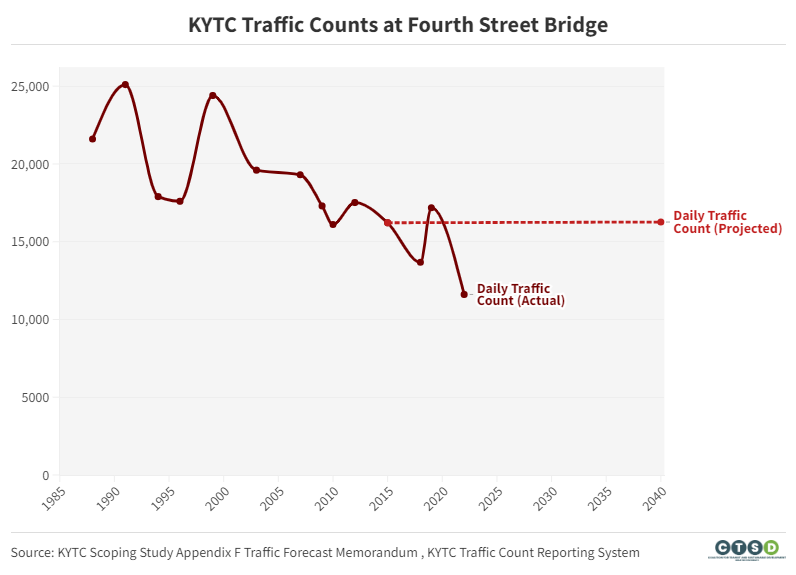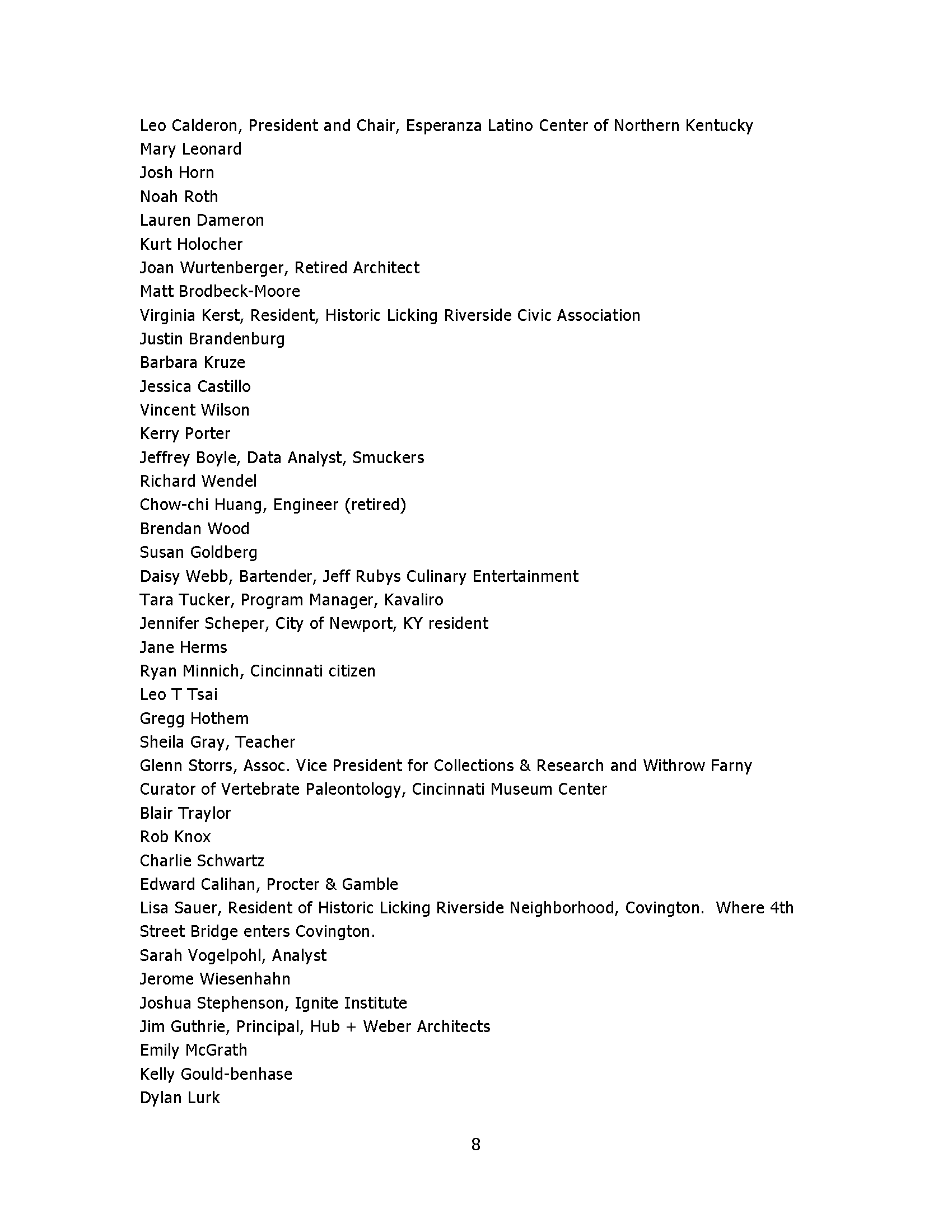We’ve taken our 4th Street Bridge Concerns to US-DOT
The recent Newport Commission Meeting exacerbated concerns that KYTC was not seriously considering community feedback, particularly regarding the community push for maintaining 3 lanes instead of expanding to 4.
When Newport Commissioner Ken Rechtin asked if KYTC tabulated public input from the many comments they’ve received, KYTC said that while their public information officer keeps a comment log, when it comes to the public three-lane versus four-lane debate, the public debate has, “no bearing on it at all.”
The vision of KYTC and the vision of elected officials and residents is difficult to reconcile.
We're proposing an alternative vision to KYTC’s overbuilt design and have brought our concerns directly to Secretary Pete Buttigieg.
The letter begins: “We, the undersigned faith leaders, civil rights organizations, environmental groups, and public interest advocates, are writing to express significant concerns about the proposed expansion of the KY8 (4th Street) Licking River Bridge linking the Cities of Newport and Covington, particularly highlighting issues of environmental justice, climate impact, resource allocation, and alternative solutions.”
The letter garnered 127 signatures in only 2 weeks, with the additional 865 Reimagine the 4th Street Bridge Petition signatures also included.
We have 5 Primary Concerns:
1) Disproportionate Impact on Communities of Color
2) Increased Global Warming Emissions
3) Waste of Public Resources
4) Replace Bridge and Invest in Public Transit
5) Economic Boost without Bigger Highways
You can add your name to the list at the form below.
And read the full letter below:
10/17/2023
Mr. Pete Buttigieg
Secretary of Transportation
United States Department of Transportation 1200 New Jersey Ave, SE
Washington, DC 20590
Letter to US Department of Transportation regarding the KY 8 Licking River Bridge Project
Dear Secretary Buttigieg,
We trust this letter finds you well. We, the undersigned faith leaders, civil rights organizations, environmental groups, and public interest advocates, are writing to express significant concerns about the proposed expansion of the KY8 (4th Street) Licking River Bridge linking the Cities of Newport and Covington, particularly highlighting issues of environmental justice, climate impact, public resource allocation, and alternative solutions.
We support your commitment to tackling climate change, advancing racial equity, and charting a more forward-thinking course in American transportation policy. We urge you to take steps to ensure that all of these issues outlined below are adequately addressed in the state's environmental review of the project. Issuing the environmental approval for the expansion of the KY8 Licking River Bridge would be wholly inconsistent with this laudable agenda, and with the Biden administration’s larger plans to address global warming, confront structural racism, and ensure a fair and effective COVID-19 recovery. This project’s racial equity problems parallel those of the Brent Spence Bridge expansion, about which the FHWA Office of Civil Rights has recently opened a preliminary investigation into Title VI violations (complaint # 2023-0134).
1
1. Disproportionate Impact on Communities of Color: The current KY8 Licking River Bridge proposal threatens to disproportionately harm our neighbors, particularly those residing in the Westside Neighborhood (census tract 501) of Newport and the Eastside Neighborhood (census tract 671) of Covington. According to the 2020 US Census, the Westside Neighborhood has the highest concentration of people of color at 39.2% in Campbell County. Similarly, the Eastside Neighborhood has the highest concentration of people of color at 64.9% in Kenton County. These residents face the risk of heightened negative consequences from the expansion.
Public officials have a long history of “rolling over” communities – particularly communities of color – to build and expand the nation’s roads. Newport is no exception: starting in the 1990’s, policymakers started clearing the Westside of Newport. The homes of over 200 families were destroyed and the people who lived there were displaced to build the KY8 and KY9 interchange. From 1990 to 2022, the Westside experienced a drastic and systematic reduction in population from 2,384 residents to 1,202. This process of “urban renewal” displaced Newport residents of color and obstructed their ability to build generational wealth.
The life expectancy of those living in this census tract is the lowest in the Cincinnati region at only 62 years. This is in stark contrast with the life expectancy of 87 years in Census Tract 268 located directly across the river and 77 years in Census Tract 532, which borders the neighborhood and is locally called “the Eastside”. Further, 40% of the households in this census tract do not have access to an automobile, which is double the rate of the Cincinnati Region.
The FHWA's requirement for Meaningful Public Involvement was not met. The Westside Neighborhood has been marginalized over time and requires strategic outreach and communications. Furthermore, the project open house was held at a time and location not sensitive to the needs of working people and was held in a location not well served by public transit from Newport.
2. Increased Global Warming Emissions: Expanding the KY8 Licking River Bridge contradicts the imperative to address climate change. We support the Biden administration’s commitment to aggressive climate action. We continue to see evidence that the transportation sector is the leading source of greenhouse gas emissions in the United States and deserves particular attention. Since 2006 Cincinnati has achieved ~36% carbon reduction. However, Cincinnati's road transportation network is responsible for 32% of our climate changing carbon
2
emissions and is not improving.
Expanding the KY8 Licking River Bridge would bring more cars and trucks to the road, leading to an increase in planet-warming emissions. This is incompatible with a climate-forward agenda. To equitably reduce emissions from the transportation sector, we must instead make it easier for people not to have to rely on cars for mobility. The air and noise pollution and quality of life concerns about the bridge project are heightened by the fact that the bridge has been weight-restricted and the expansion will increase big truck traffic, which is especially air and noise-polluting, and harmful to quality of life, to the nearby residents.
We welcome your support, as Secretary of Transportation, for public transit and safe walking and biking infrastructure. Not only will such measures considerably reduce greenhouse gas emissions; they will also make our communities fairer, healthier, and altogether better places to live – for everyone. The proposed expansion would contribute to an increase in global warming emissions, running counter to the goals of sustainability and environmental responsibility.
3. Waste of Public Resources: Expanding the KY8 Licking River Bridge would waste public funds – upwards of 25% of the bridge decking cost would be saved by keeping the new bridge to three lanes - resources that could be used to improve Kentucky’s infrastructure in ways that do not increase our dependence on cars, cause significant harm to vulnerable populations, or increase global warming emissions. The traffic projections that this project relies on were from 2010-2015; According to more recent official traffic counts, the number of vehicles per day has continued to decline and is now less than 50% of the peak in the 1990s. Growth in rush hour travel volumes hasn't really occurred or can't be and shouldn't be counted on occurring in the future – unless it is encouraged and induced by building additional lanes.
The existing plan calls for building two separate structures while leaving the existing bridge in place. This plan further increases the cost and construction time, expands the bridge footprint, creates alignment issue with the Covington street grid, and impacts the historic nature of the Licking Riverside neighborhood. Local bike advocacy group, Queen City Bike in a letter to Kentucky Transportation Cabinet District 6 on September 15th, 2023 supports a single stage teardown and replacement. They say a shuttle for people walking and biking who wish to cross the Licking River during construction will suffice. A single stage teardown will save construction time and money, it will protect historic properties and trees, AND it will enable the bridge to align safely with Covington’s 4th Street. Aligning
3
with the street grid will allow for future mass transit vehicles larger than a city bus such as BRT.
4
4. Replace Bridge and Invest in Public Transit: Rather than expanding the KY8 Licking River Bridge, a more viable option is to focus on replacing the existing infrastructure while making it transit ready. This approach not only addresses safety concerns and necessary improvements but also provides a more sustainable and equitable solution for the community.
There are more popular, cost-effective, and equitable ways to improve transportation in Newport and Covington’s East-West Corridor. In 2016, the Northern Kentucky Streetcar Committee 501c3 was formed with the purpose of supporting the southern extension of the Cincinnati Streetcar system into Northern Kentucky with a focus on Newport and Covington. In addition, The City of Newport Comprehensive Plan has a goal for leaders to work with regional agencies on any potential opportunities related to the future Cincinnati Streetcar system including providing transit access to the streetcar hub. Furthermore, the OKI North South Transportation Plan includes commuter rail crossing at the KY8 Licking River Bridge. The KY8 Licking River Bridge proposal must not preclude the possibility of providing streetcar or light rail in the future.
5. Economic Boost without Bigger Highways: Contrary to the notion that larger highways are essential for economic development, our community does not need an expanded KY8 Licking River Bridge to boost the economy. Investing in public transit and sustainable infrastructure would stimulate the local economy without exacerbating environmental and social concerns.
In conclusion, we urge the Department of Transportation to take steps to ensure that all of these issues are adequately addressed in the state's environmental review of the project in light of its disparate impact on communities of color, potential environmental consequences, inefficient resource allocation, and the availability of more sustainable alternatives.
Newport and Covington residents – and all Americans – deserve a transportation system that works for everyone in their community, that challenges rather than exacerbates long standing racial inequities, and that cuts rather than increases greenhouse gas emissions.
We would be happy to further discuss our alternative vision for transportation in Covington and Newport and across the region. Please feel free to reach us by contacting Matt Butler [via phone or email]. Thank you for your
5
attention to this matter, and we appreciate your commitment to ensuring equitable and environmentally responsible transportation solutions. Enclosed with this letter is a thumb drive with an additional 865 petitions that have been collected regarding this project.
Sincerely,






